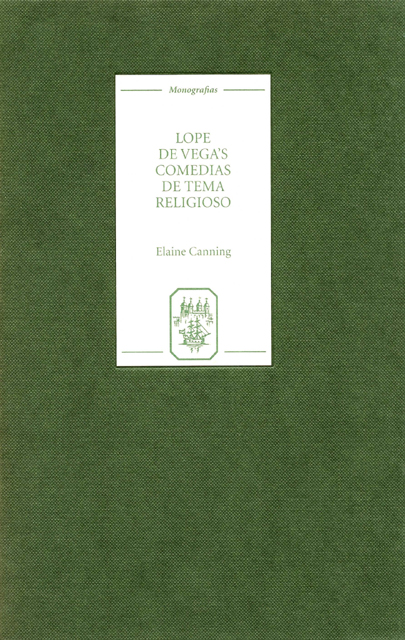Conclusion
Published online by Cambridge University Press: 04 May 2023
Summary
While this study consists of two discrete parts, together they offer a coherent analysis of the origins and key features of Lope’s comedias de tema religioso. In part I, it is evident that through the re-creation of his models, Lope is able to generate a variety of forms of audience reception, as well as to re-create identifiable and instructive images of the biblical Esther and Isidro. In La hermosa Ester, the reconstruction of episodes taken from the Book of Esther enables Lope to problematise socio-literary themes such as love, honour and the role of woman. In addition, susceptibility to a more subversive form of audience reception serves to elevate the Jew above the dramatic representation of the Spaniard. The pre-eminence of divine love over human love which is presented in La hermosa Ester is also a principal theme in Lope’s plays which deal with the life of Madrid’s patrón. Through the re-creation of the source material, Lope establishes a link between the child Isidro and his adult equivalent in La niñez de San Isidro. Lope’s innovative manipulation of the written source material in La juventud serves to present Isidro as a Christ-like and humble figure, who is willing to sacrifice human love for divine love. Moreover, the fact that Lope’s dramatic re-creations of the saint were presented to the seventeenth-century public when Isidro’s actual canonisation was being celebrated stresses the interplay between illusion and reality which prevails in these plays.
The connection between role-playing, language and costume which characterises Lo fingido verdadero and La buena guarda in part II serves to highlight the complexity of identity and the relationship between role and destino. Above all, Lope’s engagement with self-referential devices underlines the illusory nature of life and the link between lo verdadero and lo divino, which constitute the very essence of the theocentric world view of seventeenthcentury Spain. While varying degrees of audience estrangement are a possibility, particularly in Lo fingido verdadero, Lope also draws attention to the relationship between divine love and human love in both plays.
It is evident that in his comedias religiosas, Lope deals with a variety of contemporary issues which he also treats in his secular plays.
- Type
- Chapter
- Information
- Publisher: Boydell & BrewerPrint publication year: 2004



